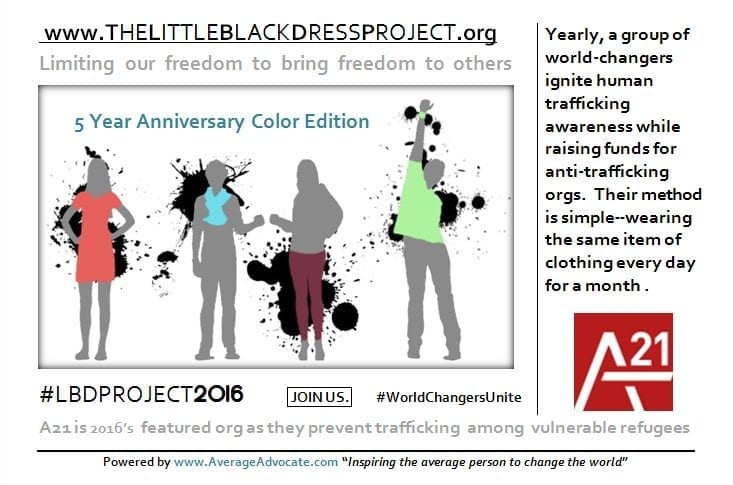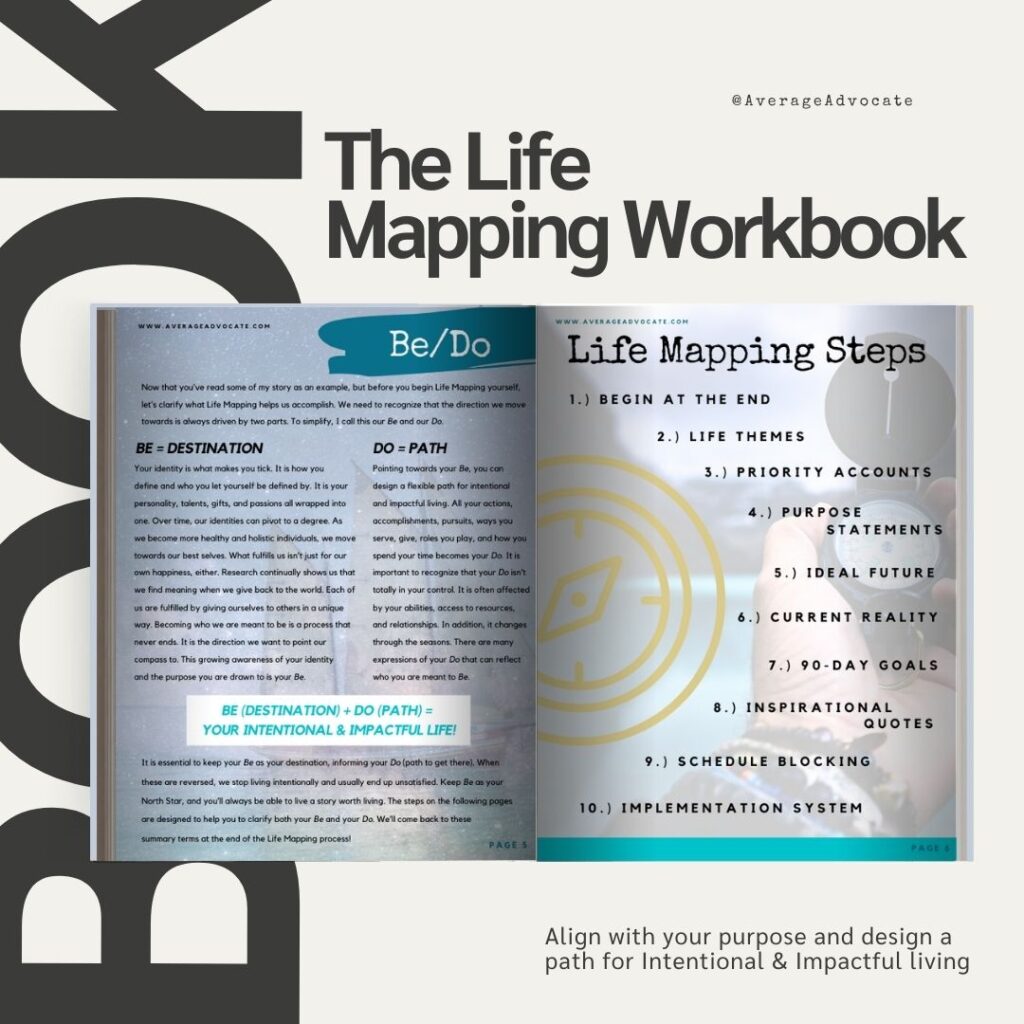No one really likes to talk much about trauma (like abuse or trafficking), including the everyday people who make up Christian churches. However, this can’t continue. Why? There are hurt individuals coming to the Church for healing from trauma. There are already many people in the Church who’ve are stuck in trauma inflicted in the walls of the Church of by those who represent the Church. Our supposedly safe space isn’t always safe, nor is it always a safe place to get help.
An awareness of trauma within the Church must be fostered so that we can begin to really overcome it.
***Note: A lot of people in the Average Advocate tribe are not followers of Jesus. However, this post is specifically addressing those who view their understanding of overcoming trauma through a Christian, spiritual lens. As always, we’d love to hear your perspective from your own worldview!***

Overcoming Trauma, Sex Trafficking and Abuse in the Church
So how to we overcome the issue of trauma in the Church? I am not 100% sure, but I do have some things I’ve seen work better than others over the years. Recently I was interviewed by Wendy Olson with She’s Got Gumption in her summer series, “Things We Don’t Talk About in Church: Trauma.” about this for you to check out.
Why Am I Talking About Trauma in the Church?
Almost fifteen year ago I became a “modern day abolitionist,” and ended up unintentionally being seen as an expert on human trafficking, which also included various types of sex trafficking. That then took me down a journey advocating against childhood sexual abuse (when I started writing stuff like this), and then walking through overcoming trauma with people both in and out of the Church (like with those who’ve lived with me). Over these years, my eyes have been opened to how incredibly common traumatic experiences are and how often they go undetected among Christians or are perpetrated by Christians.
(How common? Here’s an example. Most experts believe a minimum of 1/5 people have been sexually abused.)
Redefining Trauma so that the Church Can Overcome It
I eventually began to understand all of us have hurt that we might not define as “trauma” (most of us view trauma as something extreme). But even among those who’ve experienced what I view as “extreme,” compare their hurt to someone whose experience seems more extreme. Unless it is debilitating, it is easily minimized and can often be shoved aside. (Trust me, I’ve seen people be entirely debilitated too and think their normal is normal.)
Now I use a definition of trauma from a wise group of counselors, that I’ve seen as the most useful when leading people. Essentially, trauma is is any pain that keeps you from moving forward; where you are stuck. It can through something inflicted upon you or through experiences of neglect. Note: we tend to only attribute trauma to things inflicted, like abuse, which totally misses out on other pain (Ex. when we thought we’d be cared for, but were ignored. But this can be just as triggering when a situation arises that reminds us of a specific time when we were ignored).
When using this definition, we’ve all got stuff to deal with and overcome. We might not all have PTSD and we might not have all gone through horrific things. But, the benefit is that we can all become more fully alive when we pursue healing from even the “little” things. Besides, we also can walk with others through their trauma as we mature by becoming “unstuck” and can empathize at lot better.
At Average Advocate, I’m all about helping you move forward to be who you are meant to be and make the difference you are born to make. There comes a season (and many repeat seasons) where we must take the time and energy to find healing.
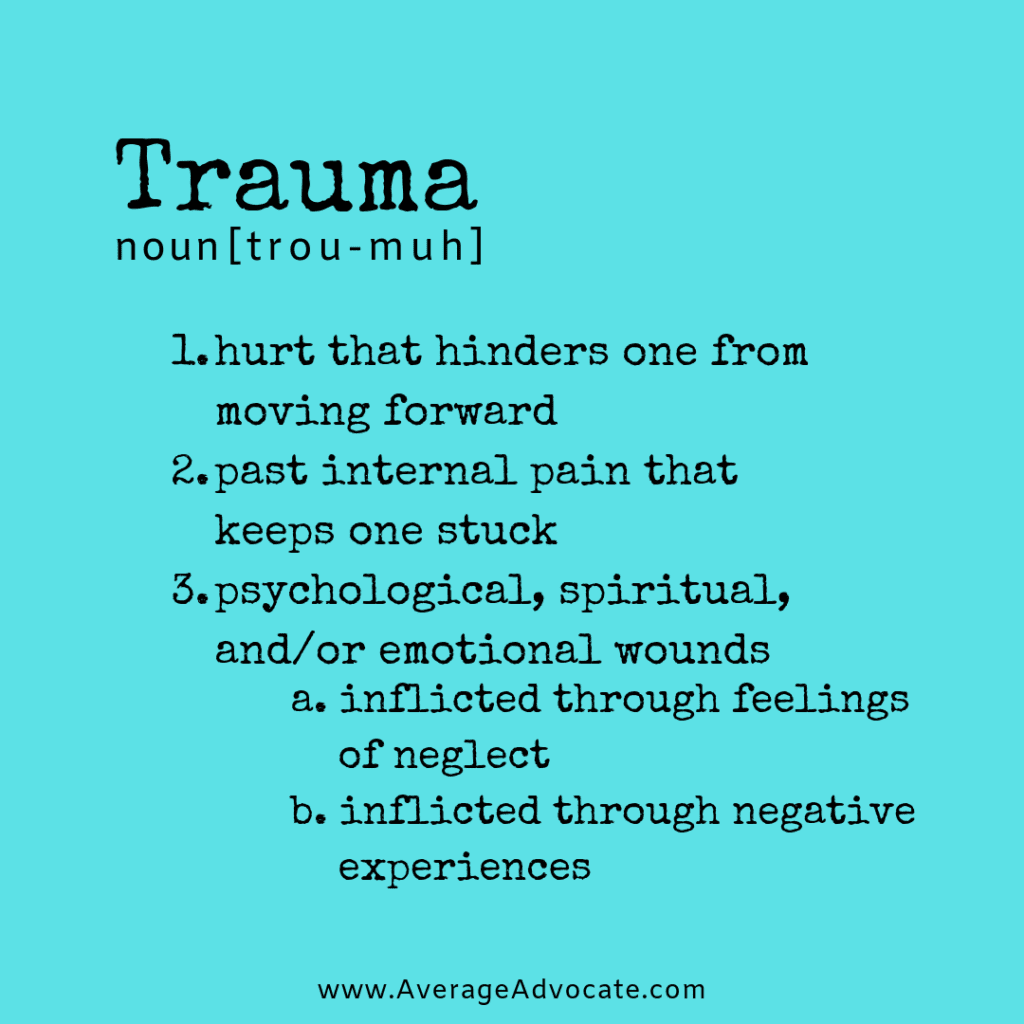
The Church’s Role in Trauma Recovery
A lot of you are curious about dealing with trauma, sex trafficking and sexual abuse, both from the perspective of a survivor and as a support person. I am convinced that more than ever, the Church needs to become renown for healing instead of hurting–that we rise to the challenge of creating a safe space in the context of Christianity for those with trauma to become fully alive. (After all, isn’t this the whole purpose of the Church? Reconciliation between humankind and God, and humankind with each other? This is the essence of Shalom, or Biblical Justice).
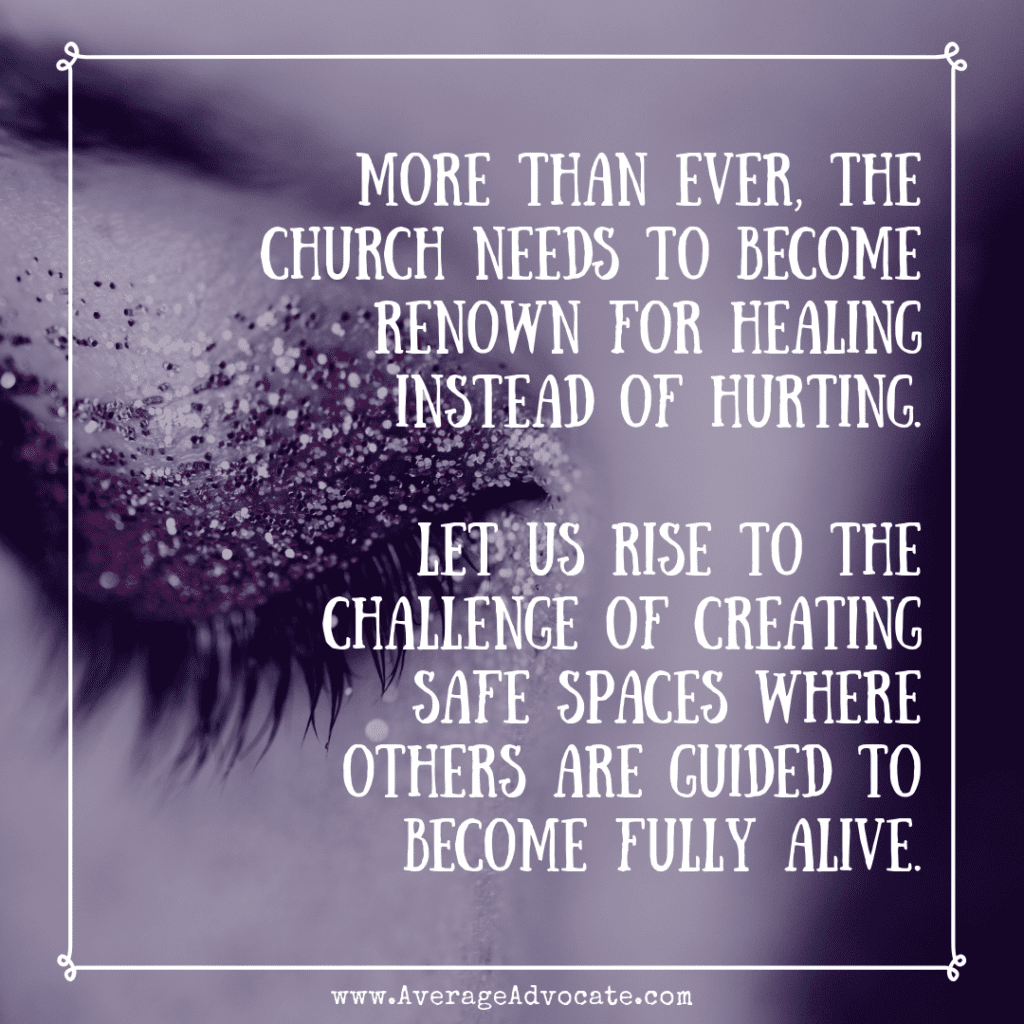
As such, conversations about trauma might be hard, but they are necessary. This podcast episode isn’t answers, but it is a beginning of this conversation. If you represent Jesus as “the Church” I beg you to join it.
Some of the things mentioned in this interview are here:
- Why we don’t talk about trauma much
- Why I became aware of trauma (the journey I briefly described above)
- Where there isn’t healing
- Triggering the need for healing
- Sex trafficking & abuse
- Where there is risk for abuse to happen at church
- How Christians are unwilling to see themselves and their kids as “at risk”
- Why it is vital to train our young people
- Walking alongside other’s trauma even if you haven’t gone through it
Ya. That is a lot of stuff. That is why it just might be better to listen to it here. (Remember, it is just a conversation “starter” not finisher–there is so much more on each of these points to talk about!) Again, although I know a lot about this, and am “trauma informed” as it is called, I am not an expert. Many of you might have more knowledge and wisdom you can pass on, and we’ll will gladly listen!
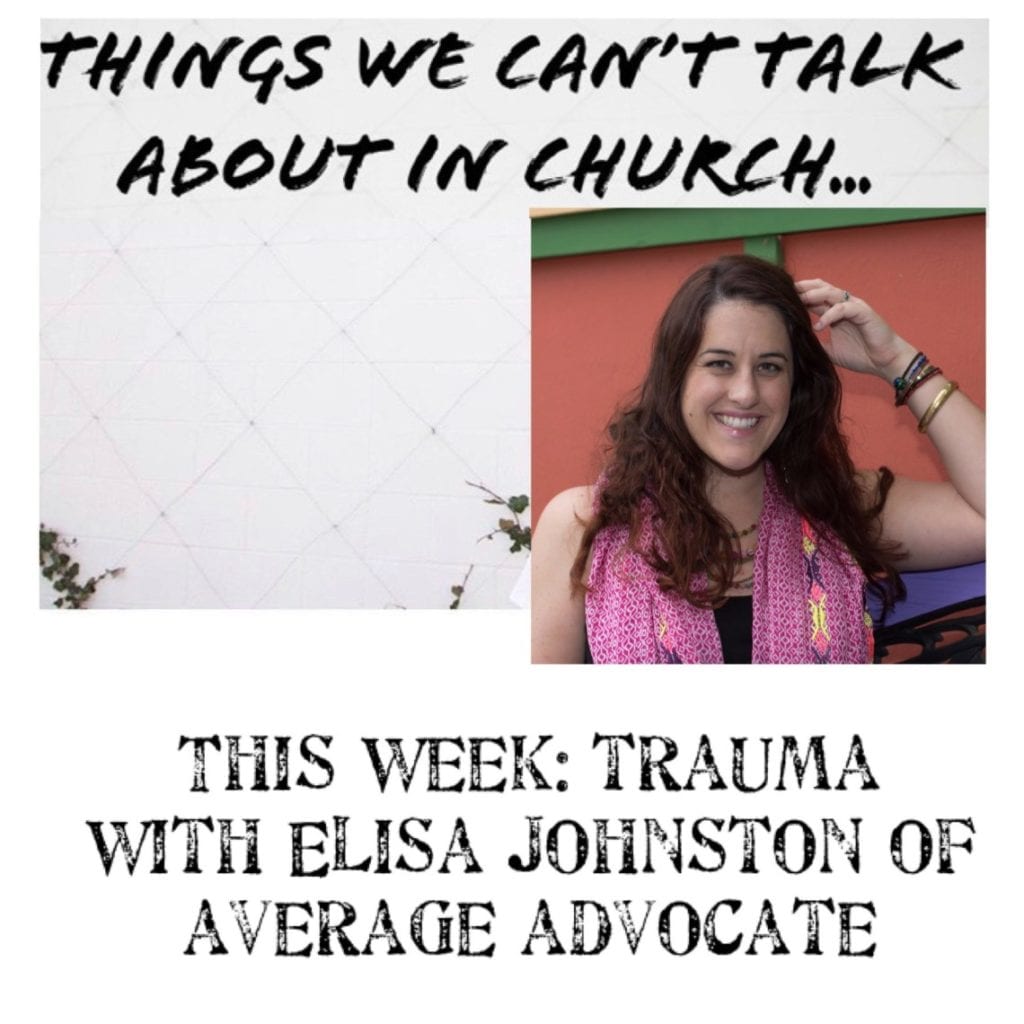
Things We Can’t Talk About In Church: Trauma
So how did Wendy Olson start this conversation? Here’s what she said:
Elisa Johnston is the most passionate person I’ve met in a while. What is she so passionate about? Sex trafficking. What else? Trauma and changing the landscape of church-culture conversations. Me too, Elisa. Me too.
In this episode we tackle the issue of trauma, and let’s face it, everyone has trauma. But what does that look like for the person in the church who isn’t getting the help they need…? Or is too afraid to speak up? Or what about the person who did speak up but was treated with sympathy instead of empathy…? Brene` Brown wouldn’t have it, and neither should we!
Listen to the She’s Got Gumption Interview!
P.S. Wait–How Do You Even Find Healing From Trauma?
Helping people heal isn’t my area; I usually refer out for this type of stuff as a life coach (I help people move forward into their future, whereas counselors are known for helping people get unstuck from their past).
However, I have walked through my own moments of personal healing and helped others walk through theirs. Ultimately, I believe healing only comes through letting Jesus into your broken places. Sincerely pursue that, and you will find life (assuming we are talking about the same Jesus here, but as so many have redefined God through history this might not be the case!
Contact me if you want to know the next step I recommend as it is simple and personal to you.
But, I am talking about the Church here, right? Where is a safe space within it? Sometimes it can be in therapy, with counselors, with prayer partners, with mature Christians (trust me, there is a difference), with resources I’ve learned from, like from Deeper Walk International, Onsite, or Boundaries. Then there are support groups like Celebrate Recovery, or healing coaches, like with Wendy at She’s Got Gumption.
HERE IS A LOUD RESOUNDING DISCLAIMER: there is a lot of “help” out there that is very unhelpful. In my experience, about 1/2 those I’ve looked to help from, or have tried to find help for others can be unhelpful at best, damaging at worst.
Which is the whole point of this conversation–the Church needs to get better at raising-up leaders who can help people through trauma. I don’t say this to warn you away from looking for guidance in the Church–you’ll need it. Just be discerning.
WHO ARE THE TYPES OF PEOPLE WHO CAN HELP YOU THROUGH HEALING?
Here are two resources I’ve used to help me determine who might be a safe space for me or others I’ve advocated for:

The Courage to Heal Workbook This isn’t a “Christian” book, but can be used applying a spiritual worldview. It has a good section to help determine whether a counselor is safe that can be applied to anyone (and it is overall a great tool for those who’ve experienced sexual abuse specifically).

Living From the Heart Jesus Gave You This is an older book casting a vision for what a Church that helps people through trauma looks like. It is a great starting point to consider your role both as a support and getting unstuck from all types of trauma. It also helps you recognize the “maturity indicators” you’d need in someone helping you through healing.




